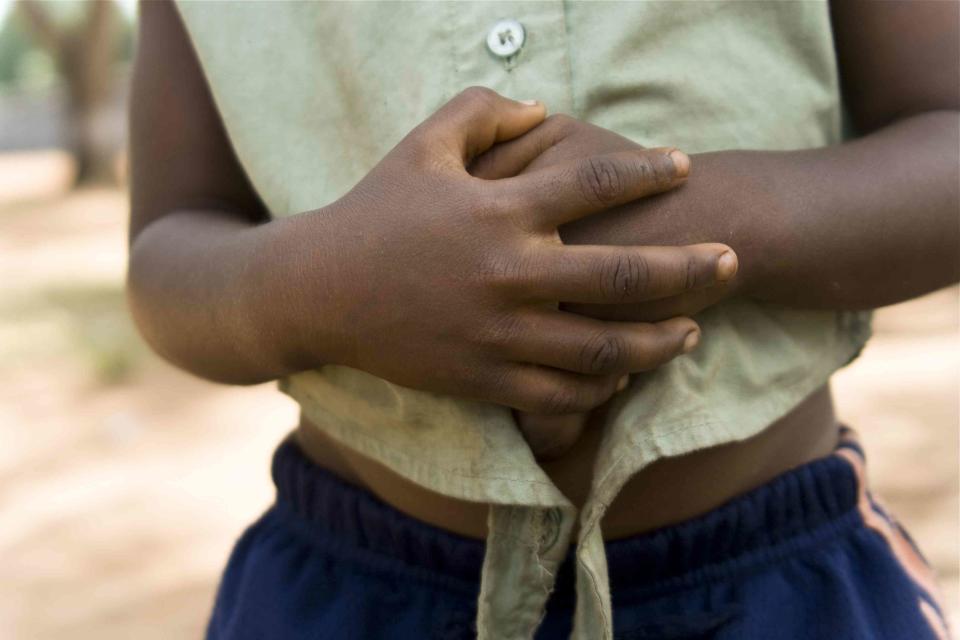8 Common—and Not-So-Common—Signs of Appendicitis In Kids
From stomach pain and nausea to fevers, appetite loss, and diarrhea, these are some of the signs of appendicitis in kids.

Getty Images
The first time my daughter complained about stomach problems was around 4:00pm on a Friday. We were getting ready for a dance competition. She was getting dressed. I was doing her makeup and hair. She was going over her routine. It was only her third performance. Her third time on stage. And I was talking to a fellow parent. We were giddly celebrating the upcoming show. But then she said her stomach hurt. She was in pain.
I asked the usual question, the one every parent defaults to. "Have you tried going to the bathroom? Maybe you need to poop." She hadn't, but after going, she felt better. There was relief. So I chalked the discomfort up to constipation. That, or nerves. But the pain returned the following morning. This time, she complained about her hip. Nausea quickly followed suit, and by Sunday evening, she had a fever. On Monday morning, she was throwing up. And that's when we went to the hospital. When we sought medical care for what I already knew: My 8-year-old had appedicitis. She had an emergency appendectomy that day.
Related:
Here's everything you need to know about appendicitis in children, from what causes it to when it usually occurs.
What Is Appendicitis?
Appendicitis is an infection of the appendix, a small organ attached to the large intestine in the lower right side of the belly. It affects one in 1,000 people living in the U.S., many of which are children. Most cases occur in those aged 10 to 30. However, it is always considered an emergency. The "cure" for appendicitis is removal of the organ, also known as an appendectomy.
What Causes Appendicitis?
The cause of appendicitis varies, from person to person and case to case; however, most instances are the result of a blockage. "When the appendix gets blocked, too much bacteria can grow and cause an infection," an article on Nemours Kids Health explains. "Some of the things that might block the appendix are hard, rock-like stool (poop), swollen lymph nodes in the intestines, [or] parasites and other infections." But appendicitis is a bacterial infection, one which is usually caused by one or more factors.
When Do Most Children Develop Appendicitis?
Most children develop appendicitis in grade school. The average age of onset is 10 years old. However, children can experience appendicitis sooner. It can happen at any age.
What Are the Signs of Appendicitis in Kids?
While most people assume appendicitis presents like a stomach bug—with nausea, vomiting, pain, discomfort, and a stomachache—that is not always the case, particularly in kids. "Loss of appetite, nausea and vomiting, hallmark appendicitis symptoms in adults, were NOT predictive of appendicitis in children," explains an article from Johns Hopkins Medicine. What's more, "children younger than 4 years are at the highest risk for a rupture... because young children have fewer of the classic symptoms of nausea, vomiting and pain localized in the lower right portion of the abdomen than do teenagers and young adults, making the diagnosis easy to miss or delay."
So what should you be on the lookout for? According to Kids Health, pain and a low-grade fever are usually the first signs of appendicitis. Other symptoms include:
Discomfort or tenderness around the belly button or in the lower right part of the belly
Nausea and/or vomiting
Diarrhea, especially small amounts with mucus
Swollen belly (though this is rare)
If your child is lying on their side with their knees drawn up and/or walking bent over this may also be a sign something is amiss.
How Is Appencitis Treated?
The standard treatment for appendicitis is an appendectomy, or surgical procedure to remove the appendix. This is because, if left untreated, appendicitis can cause the appendix to rupture resulting in serious side effects and complications. However, mild cases of appendicitis may (in some cases) be treated with antibiotics. This, however, is rare.
When Can Children Resume Normal Activity After an Appendectomy?
After an appendectomy, your child will likely be in some pain and/or experience moderate discomfort. This is normal and is not cause for concern. The good news is said pain should subside quickly and, before you know it, your child will be on the mend. No long-term lifestyle changes or dietary modifications are necessary.
But when can your child resume normal activity? While this varies based on the severity of your child's condition and/or the method of surgery performed, many kids are given the "all clear" after two weeks.

